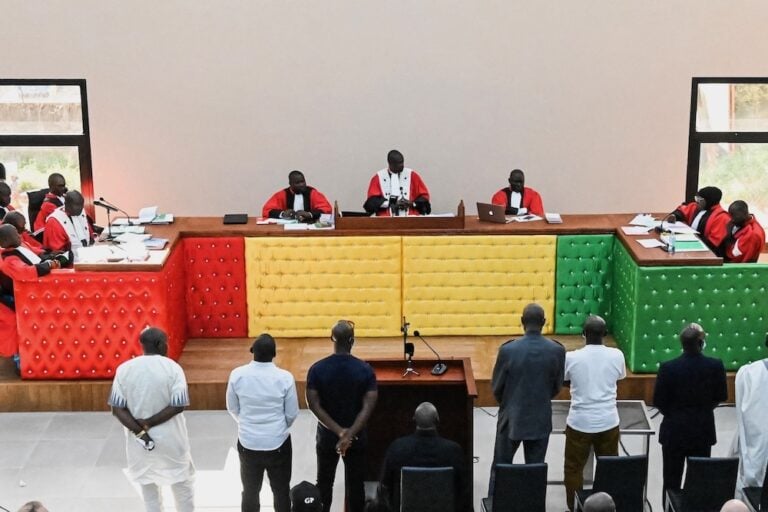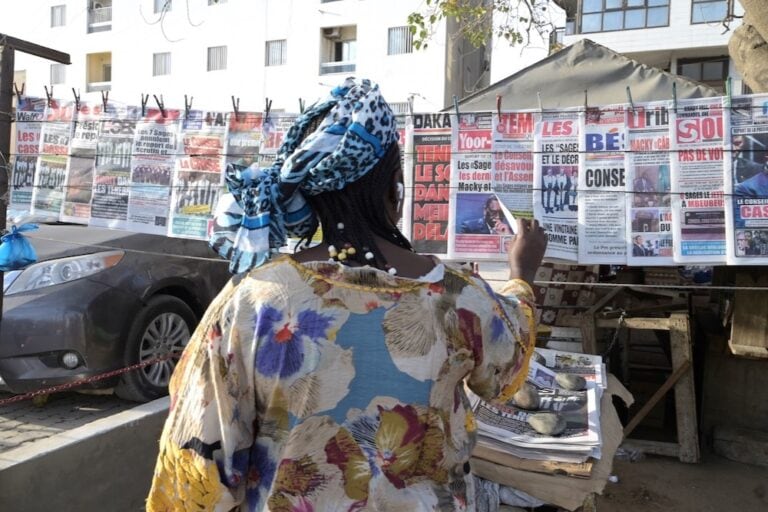Abdou Latif Coulibaly and two of his colleagues have been fined 30,000 euros and given one-month suspended jail sentences in a libel case dating to 2007.
(RSF/IFEX) – 18 November 2010 – Abdou Latif Coulibaly, one of Senegal’s most prominent journalists and writers, and two of the journalists who work with him on his weekly newspaper, La Gazette, have been fined 20 million CFA francs (30,000 euros) and given one-month suspended jail sentences in a libel case about alleged kickbacks in the allocation of a mobile phone licence.
The much-awaited sentence – issued on 16 November, two months after the libel suit was the subject of much publicized hearing on 14 September – again raises questions about the impartiality of Senegal’s judicial system and the need to decriminalize press offences.
Reporters Without Borders doubts the fairness of the proceedings in this case, which seem to have been designed to discourage one of the country’s most outspoken journalists and, by extension, intimidate all of its media, foster self-censorship and deter investigative reporting.
“At a time when a new press law has just been approved by the president and is about to be submitted to parliament, we urge the authorities to do more than just profess a desire to improve the situation of the media and journalists in Senegal,” Reporters Without Borders said. “We also urge the courts to heed and implement the government’s statements and to act with impartiality and probity.”
The libel suit was prompted by an article headlined “Thierno Ousmane Sy at the heart of the scandal”, which Coulibaly and his colleagues, Aliou Niane and Alioune Badara Coulibaly, published in La Gazette in 2007. It claimed that “foreigners in association with very highly-placed Senegalese officials shared 40 million dollars in commissions” from the sale of a mobile phone licence to the Sudanese company Sudatel and named Sy, the president’s adviser on information and communication technology, as the chief culprit. It was Sy who brought the libel action.
The trial attracted a great deal of interest in Senegal and prompted government opponents and civil society organizations to stage a parallel “trial” to hear Coulibaly’s allegations. In its comment on the official trial’s verdict, La Gazette deplored “the tendency of Senegal’s courts to interpret and apply the law on press offences in general and the defamation law in particular in a restrictive and mechanical manner.” It reduces the judge’s role to just executing repressive laws.
The trial of Coulibaly and his two colleagues has highlighted how difficult or indeed impossible it is for Senegal’s media and journalists to investigate suspected corruption within the state. It is particularly disturbing that Sy was not asked to rebut the allegations during the trial. Reporters Without Borders urges the judges handling the appeal to act with more vigilance and to prioritize the need for fairness.
Coulibaly, who also heads the Higher Institute for Information and Communication Sciences, is meanwhile involved in another libel case with the head of the Senegalese National Lottery (LONASE) as a result of his book “LONASE, a story of systematic looting.” The case is now at the appeal stage.
Renowned for the professionalism of his reporting, Coulibaly has also written several investigative books that are very critical of President Abdoulaye Wade and his son Karim.


